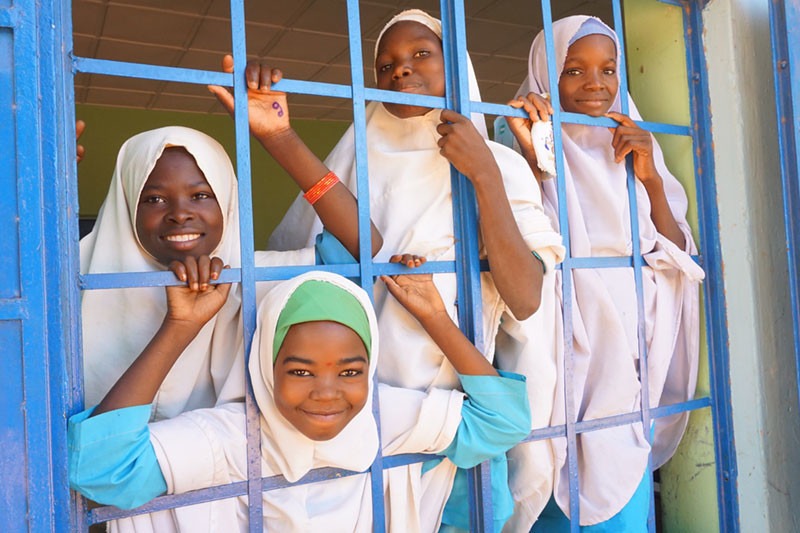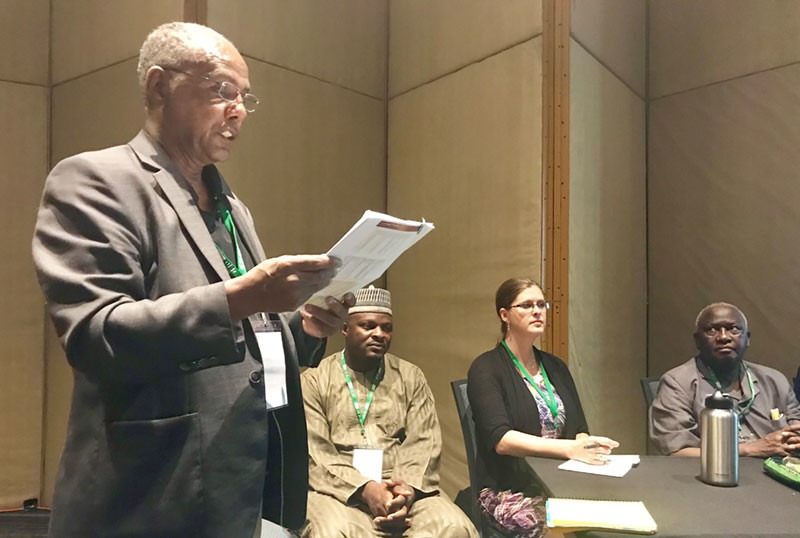MEXICO CITY — Plus que 30 pour cent des enfants d’âge scolaire dans le nord du Nigeria n’ont pas accès à l’éducation de base. Manque de motivation des enseignants et de soutien des parents, associés à un matériel d’apprentissage et d’enseignement insuffisant ont contribué à cet écart en matière d’éducation.
An integrated approach is needed to achieve optimal reading outcomes and strengthen education systems in complex environments like Nigeria, said a panel of experts at the Société d'éducation comparée et internationale (CIES) conférence en mars 27.
“The lack of formal reading national policies in Nigeria has resulted in teachers who are unprepared to teach primary school curriculum and students who are unable to gain literacy skills,", a déclaré Creative Associates International Semere Salomon, Senior Director of Africa Strategy.
For Solomon, who manages an education project in Nigeria called the Initiative d'éducation du Nord Plus, this is where a “whole child, professeur entier, whole school and whole system” approach can make a difference.

In the panel session called “Pre-Service, In-Service and Policy Reform: Un tabouret à trois pieds pour des résultats de lecture améliorés et durables en début de année,» Solomon a déclaré que le projet Northern Education Initiative Plus connaît des changements positifs grâce à une « approche globale visant à accroître l'accès et la qualité de l'éducation ».
Mobilisation communautaire efficace, réforme de la politique d'alphabétisation, collaboration gouvernementale à plusieurs niveaux, L'amélioration du matériel d'apprentissage et d'enseignement ainsi que le mentorat et l'encadrement des enseignants sont autant d'ingrédients clés dans l'application d'une approche durable., approche holistique, dit Salomon, qui a servi de commentateur au panel.
Financé par leNOUS. Agence pour le développement international, leInitiative d'éducation du Nord Plus est mis en œuvre dans des écoles formelles et non formelles des États nigérians de Sokoto et Bauchi dans le but d’améliorer les compétences en lecture de plus de 2 millions d'élèves du primaire.
Creative met en œuvre le programme en étroite collaboration avec Centre de développement de l'éducation, Université d'État de Floride et Conseil stratégique à l’étranger.
Maintenant dans la deuxième de ses cinq années, Northern Education Initiative Plus a développé un programme complet appelé Lisons! (Lisons!) pour aider les élèves à apprendre à lire en haoussa, leur langue maternelle, puis transition vers l'anglais. Le projet a distribué plus de 1.9 millions de matériels de lecture pour les étudiants et les enseignants. Dans toutes les activités, les partenaires gouvernementaux prennent les devants.
« La direction du projet est entre les mains du gouvernement fédéral., fonctionnaires de l'État et locaux," dit Salomon. « Avec une collaboration constante et une consultation continue, le gouvernement nigérian facilite le processus de renforcement du système éducatif dans son ensemble.
Le projet de lecture en bas âge crée un forum où tous les partenaires de l'éducation peuvent se réunir pour résoudre les problèmes locaux en utilisant des recherches fondées sur des données probantes., il a ajouté.

Favoriser de meilleurs résultats d’apprentissage grâce aux politiques
Représentation du projet Northern Education Initiative Plus auprès de Semere Solomon, Bilyaminu Bello Inuwa, Spécialiste de la lecture et des normes haoussa, a décrit le processus d’élaboration de la politique de lecture du projet.
« Tiré de l’évaluation en lecture des premières années du projet, nous avons constaté que plus de 90 pour cent des enfants au Nigéria ne pouvaient pas lire un seul mot,dit Inuwa. « Nous avons souligné ces éléments lors de notre collaboration avec le gouvernement nigérian pour concevoir des politiques en matière de lecture dans les premières années de scolarité. »
La direction du projet est entre les mains du gouvernement fédéral, fonctionnaires de l'État et locaux. Avec une collaboration constante et une consultation continue, le gouvernement nigérian facilite le processus de renforcement du système éducatif global.
Semere Salomon, Directeur principal de la stratégie Afrique chez Creative
Améliorer les résultats en lecture dans les premières années de scolarité, le projet a facilité un processus participatif avec les décideurs politiques pour mettre en œuvre un exercice de cartographie politique, créer trois notes d'orientation et élaborer une feuille de route pour la conception d'un cadre national de lecture.
Le trois notes d'orientation –axé sur les meilleures pratiques mondiales des programmes de lecture souvent appelés les « 5 T » (Enseignement, Temps, Langue, Texte et tests) – formuler des recommandations pour améliorer lecture en première année.
L'étroite collaboration avec le gouvernement sur la réforme politique s'est avérée efficace.
« Nous avons assisté à des changements clés en matière d'éducation dans les États de Bauchi et de Sokoto.,dit Inuwa. « Après un dialogue continu et la présentation de preuves, le gouvernement nigérian a accepté de modifier le calendrier scolaire de la première à la troisième année de cinq à dix périodes par semaine en faveur de la langue – en haoussa et en anglais.»
L'ancienne politique de lecture exigeait uniquement 30 minutes chaque semaine d’enseignement de la langue et « ce peu de temps ne mènera vos enfants nulle part »,dit Inuwa.
Pour que les étudiants apprennent à lire, les enseignants doivent être proactifs et prévoir suffisamment de temps pour qu'ils maîtrisent la langue anglaise et leur langue maternelle, il a ajouté.
Il a également souligné qu'un changement durable visant à améliorer l'alphabétisation nécessite une action systémique..
« Des politiques de lecture doivent être mises en place afin d'être cohérentes, améliorations soutenues dans la prestation d’un programme intégré de lecture précoce, et améliorer le système éducatif nigérian dans son ensemble," il a dit.
Participer au CIES?
Pour visiter le CIES de Creative 2018 Centre de rapports spéciaux, Cliquez ici. Pour connaître le programme complet du CIES de Creative 2018 panneaux, y compris les panélistes, horaires et lieux, Cliquez ici. En plus des panels, arrêtez-vous au stand 54 dialoguer avec des experts en éducation et en savoir plus sur les projets mondiaux de Creative. Suivez-nous sur Twitter @1977Créatif pour les mises à jour en direct.